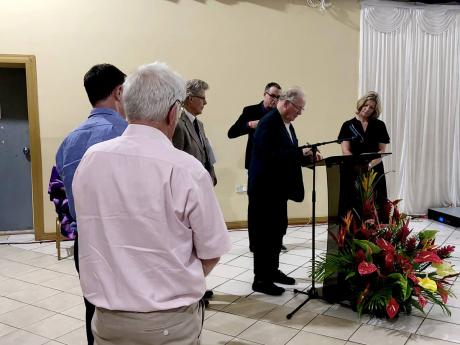Trevelyan apology a ‘clarion call’ – Gill
Grenada Reparations Committee chair calls on Caribbean govts to unite in battle for reparative justice
British Broadcasting Corporation (BBC) correspondent Laura Trevelyan, whose ancestors engaged in chattel slavery, owning over 1,000 slaves in the 19th century, on Monday issued a public apology to the Grenadian people on behalf of her family.
She was speaking at a reparations forum hosted by the Grenada National Reparations Commission (GNRC) and The University of the West Indies (UWI), which was held at the Grenada Trade Centre.
“I’m so sorry for our painful shared past and the role of our ancestors in it,” Trevelyan said, describing her family’s involvement in the enslavement of the Grenadian people as “shameful”.
Trevelyan and members of her family committed to offering financial compensation of £100,000 to establish a community fund for the country’s economic development. These funds will be managed by The University of the West Indies.
Alongside this, the family disclosed that they would also donate bursaries to the UWI Open Campus in Grenada and support the Grenada Education and Development Programme (GRENED), while offering, where possible, their time to ongoing projects in the country.
To honour and recognise those who were kept as slaves across six plantations, the forum displayed their names and ages. The Trevelyan family had shares in these estates and functioned as absentee slave owners – meaning they were owners of the estate but did not live on or manage the property directly.
Trevelyan said the family had learned of their ancestral involvement through the University College London’s (UCL) ‘Legacies of British slavery’ online encyclopaedia of British slave-ownership information which was published in 2013. The database contains information about every slave owner in the British Caribbean, with details that include, but are not limited to, individuals’ activities, affiliations, and the legacies of these men and women.
In May 2022, Trevelyan did a documentary titled Grenada: Confronting the past, in which she narrated the exploration of her family’s connection to the slave trade. It was carried on BBC World News.
LETTER OF APOLOGY
Trevelyan and her cousin John read the letter of apology, which was later signed by seven descendants who were present at the forum, of an overall 104 listed. The letter of apology was then handed to Grenada’s Prime Minister, Dickon Mitchell.
Part of the apology read: “Slavery was and is a crime against humanity. Its damaging effects continue to the present day. We repudiate our ancestors’ involvement in it. We apologise to the surviving descendants of the enslaved on those estates.”
“ We urge the British government to enter into meaningful negotiations with the governments of the Caribbean in order to make appropriate reparations to CARICOM and bodies such as the Grenada National Reparations Commission,” it continued.
Trevelyan noted that an apology was not the end of the process. “I just wanted to say that I’ve been encouraged by the number of other British families in the British Caribbean, in Jamaica, for example, who have privately written to me and said, ‘Laura, what your family has done is something that we have talked about doing for years, but we had no idea how to do it’,” she explained.
Chair of the GNRC, Arley Gill, remarked that the Trevelyan apology and financial commitment must serve as a “clarion call” to other families, institutions and governments in Europe to acknowledge their wrongs, and to apologise and commit to repairing the harms done by their ancestors.
He noted that this bold step was not expected to pay for all the debt of all British families, the Royal family, or the British government, but that it had set an example and opened a door, which they appreciate.
Gill further asserted that governments within the Caribbean region ought to do more for the struggle of reparative justice and to come together through the CARICOM Reparations Commission, through which the battle for reparative justice is waged.
“For that, our governments must consistently and publicly, with one voice, call on European nations to engage in a conversation with their counterparts in the Caribbean region,” Gill said.
He added that such conversations must evidently lead to “the creation of a comprehensive social and economic development plan that creates a stronger, sustainable and thriving Grenada and the Caribbean region”.
Gill said further that the fight for reparatory justice and the topic of slavery and reparations must be a part of school curriculum from primary level upwards into tertiary levels, “because it is only through education, rooted in truth, about our past, our present and our future, that we will truly liberate ourselves from the lies and falsehoods that we have been taught”.
Professor Sir Hilary Beckles, vice-chancellor of the UWI and chairman of the CARICOM Reparations Commission, commended Trevelyan for travelling with her family to Grenada and starting the “small but powerful” partnership between the British and the Caribbean that is sorely needed, as well as for having a common vision for the future.
“These are developments that are transforming ... the world. These are developments that require courage and commitment to look into your history, your past, and to recognise that a crime has been committed, a crime that has led to your own enrichment and privilege and to be able to say, ‘This is wrong, it was inhumane’.”
Beckles said the British government must accept “that there is a debt to repay” after leaving behind Caribbean countries that are in financial ruin as a result of wealth extraction, among the other horrors of slavery.
“We believe that reparations is the key for a win-win strategy for both sides of this conversation,” he said.

